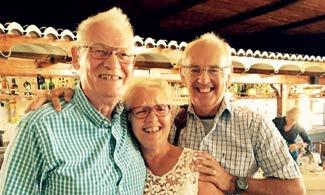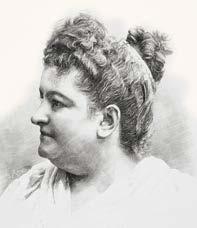






















The ‘theft’ by the Hacienda tax authorities has nothing to do with them, they insist. It should have actually been paid by the previous owners of the three-bedroom property in 1996 - SEVENTEEN years before they bought it.

home in May. The former estate agents - who closed their Marbella firm due to Covid in 2022 - had decided to downsize from San Pedro to Tarragona (Catalunya). They calculated the sale, plus other investments, would take care of them through retirement. However, the outstanding IBI (rates) bill from 1996 has left them ‘financially short’. They had bought the property in 2013 and hired a legal firm to do the conveyancing.
“Our lawyers obviously didn’t do a proper job as they assured us there was no debt on the house, we made sure of that,” John told the Olive Press
“The money was meant to pay off our car loan and other debts. Instead, we are struggling to pay them - at an age when we should be enjoying our retirement.
“When our lawyer gave us the news, I said there must be some mistake. In fact I was devastated by it.” His lawyer, Alvaro Moreno, of Armo Legal Services, admitted the case was ‘quite strange’.
“Normally these things come to light when you’re going through with the purchase, but there was no mention of the debt on the title deed,” he told the Olive Press this week.
The problem, he admitted, was that the outstanding debt was only being posted on the official public buletin for Andalucia ‘at least once every four years’, meaning it stayed valid.
It is normally the responsibility of the lawyer handling the sale - in this case Moreno’s former partner, Rafael Arevalo.
But, it turns out Arevalo was not acting as John’s legal representative in the purchase.
While an email chain seen by the Olive Press shows Arevalo acting as ‘Mr Stephenson’s Lawyer’, he oddly only signed the title deeds to the property as ‘a witness’.
It was something John failed to pick

up on at the time due to not knowing the Spanish word for ‘witness.’ And as a witness, it means Arevalo was ‘not liable’ for failing to find the outstanding charge.
“If I’d wanted a witness, I could’ve got anyone off the street to do it,” insisted John.
The Olive Press has been unable to get in contact with Arevalo to clarify the situation and the ex partners at Armo Legal are ‘no longer on speaking terms’.
“This is totally unacceptable,” insist-

DREAM TURNED TO NIGHTMARE: Massive tax paid on sale of their home has left John and Kathy Stephenson out of pocket ed well known property lawyer Antonio Flores, who runs Lawbird, in Marbella. He insisted it is com-

pletely up to Arevalo and Moreno to prove they correctly did the due diligence in 2013 - and not the other way round.
“The lawyers have to prove they did everything right,” he said. “They have to show that they looked in all the right places.
“They should’ve fought harder against this mystery tax bill. John and Kathy shouldn’t give up.” Opinion Page 6


ELDERLY women were robbed in their Cullera homes by two sistersincluding their cleaner - who took jewellery to pawn off.
VALENCIAN tourist minister Nuria Montes has welcomed revised EU legislation which allows regional governments to fine online websites advertising unlicensed holiday lets.
AN Elda man has been jailed for eight years and given a €600,000 fine for possessing four kilos of cocaine and hitting police officers who were arresting him.
TWO people have been caught selling 1,300 items of fake sportswear worth €80,000 in three stores in Benidorm's Rincon de Loix area.
A VICTIM of Spanish-based serial fraudster Mark Acklom won’t get any compensation from her bank after being conned out of £750,000.
Barclays Bank says that a six-month internal investigation has shown that they are not liable to make Carolyn Woods any payment.
Woods argued that since a Barclays worker and a former employee were arrested during the police investigation on suspicion of conspiracy, the bank had failed in its duty of care to her as its customer. Neither of those probed were subsequently arrested. Mark Acklom, 50, moved to Spain with
his Spanish wife Yolanda Ros in 2013 after a romance scam involving Woods. He duped her out of her life savings by using the alias of Mark Conway who claimed to be a Swiss banker and MI6 agent. He persuaded Woods to move her money into a Barclays account and then got her, to transfer it all in a series of ‘loans’ into the account of an associate who was a former Barclays employee.
The incidents began after he moved into the mother-of-one’s home in Montserrat, Valencia, in September 2021.
ByOn one alleged occasion, the boyfriend went into a rage because she blew on a hair clipper and acciden -
A VALENCIA Guardia Civil officer has been arrested after allegedly beating up his wife when she revealed she was leaving him.
The victim, 50, was allegedly hit on the head with a frying pan at their Benicalap home before her partner, 52, tried to strangle her.
Policia Nacional said the brutality of the assault was such that
she begged him to kill her to put an end to her suffering.
The woman was treated for injuries to her head and face and had suffered several rib fractures.
The suspect had been on sick leave for months due to depression, meaning he had no access to his gun. He has no previous record of violence or ill-treatment.
tally spat out some saliva. She was tied up and had a knife put to her neck while her partner threatened that there was ‘going to be blood’ and that she ‘deserved to die’, it is alleged.
According to the charges, he then untied her and forced her
to grab her pet rabbit by its legs before he slit its throat with a knife - all the time forcing her to watch to ensure ‘she learnt her lesson’. The victim said she took refuge in the bathroom and locked herself in, but he broke down the door and dragged her to the dining room where she was forced to see the rabbit’s body. He then allegedly smeared some of the rabbit’s blood on her face, and hours later he cooked the animal and forced her to eat it.
Another alleged attack in January 2022 was the final straw when he grabbed her hair and punched her in the left eye. It wasn’t until two days later that she filed a complaint and was seen by a doctor, before leaving her Montserrat home with her young son.
A TODDLER has been placed in the care of his grandmother after being found walking alone barefoot in Petrer. The boy, aged 18 months, was spotted semi-dressed with a nappy by a man who sheltered the youngster in his car. After finding his home, the mother said she had driven her husband to work and left the boy at home - supposedly in the care of another person who had fallen asleep. But police discovered drugs had been consumed at the property, which was in a dirty and messy state.
A POLISH fugitive has been arrested in Benidorm after fleeing his home country where he had been serving a seven-year jail term.
The man, 34, had been convicted of fraud, kidnapping, hostage-taking and armed robbery. He committed the crimes in Wroclaw in 2016 and 2017, and escaped from Poland with nearly six years remaining of his sentence.
Polish authorities issued a European Arrest Warrant against him two years ago and the Policia Nacional were contacted after a tip-off that he was living somewhere on the Costa Blanca. Officers found him at a Benidorm tourist apartment and he will now be extradited.


A FEMINIST association has collected more than 1,500 signatures in a bid to cancel Spain’s controversial Eurovision entry, Zorra The song from Alicante duo Nebulossa was chosen as the winning entry at this year’s Benidorm Fest. Zorra, however, has caused controversy due to its lyrics and its title, which means ‘vixen’ in Spanish but can also be used as an insult similar to ‘bitch’.
In response, the MFM Madrid feminist movement has launched a petition about a song that it claims ‘represents a sexist insult and is a trivialisation of violence against women’. For its part, the band Nebulossa (pictured) has defended its song.
“The word zorra is going to start to be seen in a different way,” said singer Mery Bas.
“People say it freely, we have totally redefined it,” she added.
RAFAEL Nadal has sparked a backlash after doubling down on his belief that women in sports should not automatically be paid the same as men.
The Grand Slam champion, 37, was talking to La Sexta presenter Ana Pastor to discuss the opening of his new tennis academy in Malaga. However questions soon turned to recent controversial topics, including his collaboration with Saudi Arabia and his thoughts on the gender pay gap in sports. Pastor told Nadal that he seemed ‘uncomfortable’ at
By Laurence Dollimorethe mention of feminism. The Mallorca native - who has won €125.2 million in his career - has previously said he is against women and men being paid the same in tennis. Nadal told Pastor: “Not at all, what I am not is a hypocrite to say that these things are easy, and I don't think they are.
“Investment? The same for men and women. Opportunities? The same. The same salaries? No, for what? “What is unfair is that there are not equal oppor-


tunities. If you're saying that being a feminist is believing that a man and a
woman deserve exactly the same opportunities, then I can say that I am a fem-



FANS of legendary Australian rock band AC/DC are in for a treat later this year, when the group pays a visit to Spain. As part of their Power Up European Tour 2024, the authors of Thunderstruck and Highway to Hell have chosen Sevilla for their only Spanish date on May 29 at the Estadio de la Cartuja Vocalist Brian Johnson will be on the mic, with guitarists Angus Young, Stevie Young and drummer Matt Laug. New bassist Chris Chaney will be taking over from original band member Cliff Williams.
The tour will kick off on May 17 with gigs in Germany and Italy, before the Spain concert on May 29.
The band will then travel to the Netherlands, Austria, Switzerland, England, Slovakia, Belgium, France and Ireland.
HE is more used to wearing Armani, but now famously elegant actor Luke Evans (far left) will be able to show off his own line of clothes.
The Welsh star and his Spanish boyfriend Fran Tomas (left) have teamed up with stylist Christopher Brown to launch a menswear brand called BDXY.
It will feature outfits inspired by the screen legends of Old Hollywood, concentrating on basics and everyday essentials.
Evans, who is the star of major movies such as The Hobbit , Beauty and the Beast and Fast & Furious 6 confirmed his relationship with Tomas back in December 2020.
Tomas, who is originally from Alicante, works as a project manager in the construction sector.

inist. “But equality for me is not based on awarding for awarding’s sake, equality resides in if Serena Williams generates more than me, I want Serena to earn more than me.”
Williams is the leading woman having won €88.2 million in her career.
Some users of X blasted Nadal’s comments as machismo, or sexism, while others backed him, with one writing: “It’s not fair that someone who generates more sales from tickets and t-shirts earns the same as someone who generates much less.”

The
Numbers have fallen due to poaching and the destruction of their natural habitat, namely rainforests.

BENIDORM is building a new themed tourist resort called ‘Magic Pirates Island’, it has been announced.
Work has started in the Marina d’Or tourist complex next to the Terra Natura and Aqua Natura parks in a joint 50-50 venture between Grupo Fuertes and Magic Costa Blanca.
It will be their second collaboration in Benidorm on the site after their Magic Natura Resort opened in 2018, with 350 cabins.
The new resort will feature 270 cabins and will be built on land covering 32,000m2, with the accommodation inspired by pirate legends.
The units will be part of a large themed complex aimed at families and equipped ‘with the latest leisure technology’ which the developers say will provide guests with the immersive experience of living on a pirate island.
The resort is scheduled to open in the summer of 2025 and will employ 200 people.
Historic Fallas festival dating back to the 15th century comes to Valencia this weekBy Alex Trelinski
VALENCIA'S historic Fallas celebrations will kick off this weekend with an impressive firework display at the Serrano Towers.
The annual festival begins on the last Sunday in February with a professional demonstration of rocket-lighting in the Plaza del Ayuntamiento.
The daily Mascleta show of very loud firework explosions then starts on March 1 and is held daily at 2pm, also in the Plaza. Events are then ramped up to a maximum over the last five
OVER 20,000 cubic metres of sand will be restored to Tavernes de la Valldigna beaches ahead of the summer season. The fight back against coastal erosion will see extra sand added to Playa de La Goleta and the northern area of the urban beach. Sand stocks have been built up over the

days between March 15 and 19. Besides extra firework displays at the Turia Gardens, there are the big figurines
last few months at a municipal site and the amount will be doubled by the Costas authority.
The plan is to recover around 10 metres of beach width before the peak tourist season. Tavernes mayor Lara Romero admitted that it was a temporary fix: "Beaches have stopped building up sand naturally and the problem will be eased until a regeneration project is carried out which is budgeted at over €20 million.”
known as ninots made by groups from different city districts.
They are erected locally and take part in a competition for the best design.
Most of the big creations have a sense of irony and social commentary mixed with humour.
A ninot exhibition featuring all the caricatures is running until March 14 at the Science Museum of the City of Arts and Sciences before they take to the local streets.
Ninots of Donald Trump, Adolf Hitler, Josef Stalin, and General Franco plus current

WEATHER experts are predicting that this winter in the Valencian Community will go down as the mildest since at least 1950.
The State Meteorological Agency (Aemet) said that temperatures have been 2.3C higher than the average between 1991 and 2020. There have been several warm peaks with temperatures more typical of May rather than late February.
With the current forecast suggesting normal temperatures from Friday for the rest of the month, Aemet is confident that the seasonal record will be broken.
The previous warmest winter was in 1965-66, but the current season is 0.4C warmer.
Spanish politicians have all featured in recent years.
All of the giant statues are burnt in the Crema at the end of the Fallas on March 19. The celebrations date back to the 15th century when carpenters celebrated the arrival of spring by burning wooden planks used to prop up their lamps during winter.
That date is also the feast day of the patron saint of carpenters, San Jose, who is also Valencia’s patron saint.
The big showcase event was included on UNESCO’s cultural heritage of humanity list in 2016.
Meteorological seasons are different from conventional seasons with winter running between December 1 and the end of February.
All change
SAFETY improvements including new junction layouts costing €1.7 million are to be carried out on the N-332 northern access links to Gandia.
Two junctions with the N-337 - also known as Cami de la Sequia del Rei - and with Calle Valencia will be redesigned. New filter lanes and a more consistent road layout are part of the project, along with enhanced signage.

BENIDORM will get its first ever crematorium after 19 years of plans being blocked by red tape.
People have been forced to go to Villajoyosa and other centres to say goodbye to family members and friends because no facility existed in a city of more than 70,000 residents.
Benidorm's local government has now granted a licence for a crematorium to be built at the Sant Jaume cemetery.
An operating contract was awarded in 2005 to Grupo ASV who also run the Villajoyosa facility.
Lengthy delays were caused by the proposed building being constructed on non-developable rural land and mandated changes to the Highway Law to define public domain areas.
EXTRA workers have boosted local health centres after they were placed back under public management.
Some 190 doctors and nurses have already been taken on in Denia, Javea and Calpe.
The Denia Health department employed 1,350 at the start of February with plans for a progressive increase of around 350 people.
That process has been accelerated with some of the new doctors also allocated to Denia hospital where there has been a shortage of specialists.

THE much-loved founder of the Brexpats in Spain support group Anne Hernandez has died.
Tributes have poured in for the ‘tireless’ campaigner following her death from a short illness. Anne worked tirelessly to help the hundreds of thousands of Brits whose lives were upended by the Brexit vote, for which
she was awarded an MBE in 2021.
She worked closely with the Olive Press in recent years, and even wrote a column for us for a time.
Publisher Jon Clarke said: “Anne was tireless in her work
and a true inspiration to the expat community.
“We worked very hard together to campaign against Brexit from Spain, and I always admired her tenacity.
“Despite not getting the result either of us wanted, Anne dedicated years to helping Brits deal with the fallout. My condolences to Anne’s friends and family.”
A RUSSIAN pilot who was assassinated in a car park in Spain was killed with bullets made in Russia, it has emerged.
Maksim Kuzminov, 28, (pictured) was shot at least five times underneath an apartment complex in Villajoyosa, Alicante on February 13. Sources close to the investigation said that the bullets were Russian-made, adding weight to the theory that he was killed for his defection to Ukraine.
The sources believe it was no accident that the bullets could be traced back to Russia, as they now served as a warning for others planning to desert Vladimir Putin’s forces.
VALENCIA will be the first European city to use a phone app that helps people with reduced mobility locate car parking spaces. The pilot project will be tested in five areas of Spain, with Valencia top of the list to benefit from the Google-backed Spot4Dis app. It will display parking information as well as details about a selected area, incident reports, and voice commands to enhance the service provided to users.
The enhanced app is a development of the existing Park4Dis service and will utilise Google's AI, Street View , and satellite image programmes.

According to the Kyiv Post, Kuzminov seized control of a Russian Mi-8 helicopter last August and brought it safely to an airbase in the Kharkiv
region.

It was all part of a Ukrainian intelligence operation named
‘Titmouse’, which saw him bring the military chopper to awaiting Ukrainian officialsalong with valuable documents and secret technical equipment. Kuzminov said his motive for helping Ukraine was his opposition to the Russian invasion, saying he didn’t want to be a part of it. He was reportedly promised several guarantees for his defection,
including security, new documents and monetary compensation.
According to previous reports, a resident found his body on the ramp of the underground car park on Calle Marinada - an area full of tourist apartments.
The witness also spotted a car driving away that was subsequently found on fire some 20km down the coast at El Campello.
The shooting was apparently carried out on the second floor of the car park with the victim trying to flee before collapsing on the ramp.
A SENIOR prosecutor has pleaded with conspiracy theorists to stop filing denuncias about ‘chemtrails’ - the white trails left by planes in the sky due to condensation.
Teresa Gisbert, the Valencian Community’s lead prosecutor, said reporting of chemtrails remains common in Spain.
It comes despite an exhaustive technical study by the Environmental Prosecutor’s Office that officially concluded it is a phenomenon caused by condensation and temperature change.
Nevertheless, Gisbert said that some people are still prepared to come up with their own outlandish theories that her officials have to deal with. Nobody is wanting to poison us or throw toxic gases onto us,” she added.
OVER 359,000 passengers used the port of Alicante last year - up by 47% on 2022 figures. The rise was well above the national average increase of 18.9%.
Some 85 cruise ships docked in 2023 compared to 62 the previous year, with more liners expected during 2024. Cruise passengers accounted for 54% of the Alicante total with the remainder coming via the ferry link with Oran (Algeria) which runs four sailings per week.


YOU trust them to look after your best interests - especially when large amounts of money are involved.
Lawyers are the first port of call when buying a property - especially if you do not speak the language or know the system.
As our front page story (Stitch up) shows, retired estate agent John Stephenson, 75, and wife Kathy, 78, did everything right when they bought their property - at least they thought they did.
They put their faith in lawyer Rafael Arevalo to navigate them through the sometimes choppy waters of buying a house.
They thought all the proper searches were completed - the most important of which was to ensure there was no outstanding debt on their dream home when they bought it.
All seemed well until 10 years later when they sold up to help finance their retirement.
It was only then they were stung with an €11,200 bill for past IBI taxes that really should have nothing to do with them.
They have had no option but to pay up. But what of their lawyer at the time of the sale? Arevalo should be held responsible for the mess they are in and his insurance should pay up for his oversight.
After all it was literally his job to make sure they would not have any nasty surprises.
Or - and here comes that phrase again - so they thought.
It turns out that in all the documents, he signed as a ‘witness’ not as a legal representative.
So, they hired a lawyer, he did the paperwork, but it is now claimed he was never actually representing them legally.
And - as is so often the case with incompetent lawyershe is now nowhere to be found.
And then there’s the lawyer today. As other lawyers consulted by this newspaper have suggested, Alvaro Moreno should have done more to contest the clearly unfair IBI payment.
It is a story we at the Olive Press have heard time after time. ‘Professionals’ who expats trust are too often incompetent at best, corrupt at worst and never seem to face the music.
Well they should be made to, in the dock if necessary.
Jon
Walter
Simon
Alex
Ben
2016
THE British family of the first suspected Nolotil victim in Spain have recalled their heartbreaking experience amid a growing campaign to crackdown on the ‘lethal’ painkiller.
When James Hanley, 72, decided to move to Spain in 2016, he was dreaming of retirement in the sun. But within a year he would be dead, after taking Nolotil to numb his pain following successful cancer treatment. His story would go on to serve as a leading case study for a campaign to ban the drug, launched by medical legal expert Cristina del Campo.
James, a former ferry steward, ‘had very good friends in Spain’ and went to visit them often before deciding to leave Ipswich in search of the expat dream.
His nephew, Daniel Preston, told the Olive Press: “He embraced it and threw himself into the local community.”
‘If he hadn’t gone to Spain he could still be alive’: British family of ‘first known Nolotil victim’ speaks out


James was ‘living his best life’ in Javea, Alicante, getting a ‘nice’ apartment, adopting a stray cat and enjoying local restaurants.
Just months into his retirement dream, the ‘bubbly’ expat, received the shocking news he was suffering from rectal cancer. After removing the tumour, James was given
Our postbag has been full since we revealed the Nolotil scandal
I AM really pleased you are campaigning for the banning of Nolotil. When I had a hip replacement operation at IMED in Benidorm in 2019, this was put in my drip bag until I noticed, then told them to replace it. I then contracted an infection in the hip, which took about two years to be eradicated but, obviously, I have no specific knowledge that it was because of the Nolotil.
Since then every time I go into a hospital or health centre, I tell them that I am allergic to Nolotil but very few note it on my records, so I have to be very aware in situations where it might be used. Similarly, for Ibuprofen, as I am on Lixiana, a blood thinner. That has to be closely monitored too!
John Price
Editor’s note: Keep taking care! As a clarification, we are not calling for Nolotil to be banned, but rather that the official guidance be followed and Nolotil not be prescribed to Northern Europeans.
I WAS prescribed Nolotil 575mg capsules in June this year. But when I spoke to my husband’s doctor in the hospital she told me not to take them. She explained they are not for British or Scandinavians, they are for Spanish people. So I never took them, in fact I still have them untouched.
Mrs Carol DundridgeI SUFFERED extreme pain from a rib fracture and was prescribed painkillers that had no effect. The doctor at the Ciudad Patricia care home then prescribed Nolotil. I took seven and still had pain. However I am still alive, having not suffered any apparent side effects. I wonder if the fact that I am half Italian has made me immune to the severe side effects suffered by many expats.
Pamela MurphyNolotil, also known as Metamizol, to combat the pain of his cancer treatment.
All seemed well, until just days later ‘he couldn’t breathe’.
Back in the UK, concerned family members urged James to see a doctor and he was immediately hospitalised.
Daniel flew to Alicante ‘not really sure’ what was wrong with his uncle.
iel.
But at the service, he reunited with Cristina del Campo, a medical translator who was ‘adamant’ that something wasn’t right with James’s case.
She said: “After James died they told me he also had sepsis amongst other things, I had heard that word recently, in relation to the death of an Irish woman.
“I started looking into it and I began to see a pattern, everyone who died had taken Nolotil. Many had sepsis and Fournier Gangrene.” It is thought the drug reduces patients’ white blood cell count, leaving them vulnerable to infection.
After James’s funeral the family began to question his untimely death
The rapidly progressing illness was soon revealed to be a form of sepsis known as Fournier Gangrene, an aggressive, flesh-eating disease.
“I remember at one point the bedsheets fell away and exposed his body. It was horrific, this flesh eating bug had ripped through his body and was eating away at him,” Daniel said.
“It was clear to me that there was no stopping it, it was too aggressive. And sure enough, we went home due to work commitments and a few days later he was gone,” said Daniel.
For James’s sister, Bridget, the news came as a terrible shock.
The care worker, who stayed in Essex due to a fear of flying, said it was ‘absolutely awful’ to not be able to be there for her ‘beloved’ brother.
It wasn’t until James’s funeral that the family began to question his untimely death.
“We just thought it was a really unfortunate case at first and we didn’t think too much about it,” said Dan-
The condition, known as agranulocytosis, is believed to be a result of genetic differences in Northern European populations.
Cristina has now been fighting against Nolotil for the past seven years with her campaign group the Association for Drug Affected People (ADAF).
It aims to compel health workers to stick to a 2018 directive which restricted the prescription of Nolotil for ‘short term use’, with ‘significant consideration’ of patients’ backgrounds, including genetic vulnerability to dangerous side effects.
When asked for comment, one company that supplies metamizole in Spain, Boehringer Ingelheim, said: “Agranulocystosis is a very rare, adverse reaction that has been known for decades and is well-de

Sign our petition to urge healthcare providers to stop giving the ‘lethal’ painkiller to northern Europeans
THE Olive Press has launched a petition to urge Spanish healthcare providers to stop giving Nolotil to northern eu- ropean patients.
Also known as metamizole, Nolotil is a popular painkiller in Spain.
However, it is known to cause agranulocytosis, or se- verely low white blood cell count, in northern European patients, leading to organ failure, sepsis and gangrene. The drug has been linked to at least 40 deaths of British and Irish people in Spain.
Despite a 2018 informative note issued by the Spanish Medicine Agency advising medical professionals to not administer the drug to northern europeans, people keep dying.
Yet still, readers contact us everyday saying they have been offered the drug.
That’s why we’ve launched a campaign urging medical professionals to comply with the 2018 advice.
If you agree that it should be followed, please sign our pe- tition, go to Change.org and search Stop Nolotil Deaths.


PROGRESS: Spain’s gender equality ranking has improved since 2020
Spain ranks fourth in the EU Gender Equality Index and Yzabelle Bostyn explains why…
FEMALE equality in Spain had a big year in 2023.
In December, Spanish politicians approved an ‘Equal Representation’ Law designed to encourage gender parity in politics and business.
It followed a landmark victory for the country’s menstrual leave law, which was the first in Europe to grant leave for women with painful periods.
Despite all these laws, controversy surrounding women’s rights continues to sweep the country. While some 67% of women believe discrimination remains ‘quite large’ in the country, over 44% of Spanish men say equality has ‘gone too far’.
activities, the gender imbalance flips.
Some 39% of Spanish men say they frequently take part in such activities, compared to just 33% of women.

So, how does Spain really perform when compared to other EU countries? The Olive Press investigates.
With 76.4 points out of 100, Spain ranks fourth in the EU’s Gender Equality Index. 6.2 points above the EU average, the country has moved up two places in the ranking since 2020.
The index is calculated based on a number of different indicators including time, knowledge, work, money, power and health.
Each of these is given a score worked out using a variety of data, for instance, power takes into account the amount of female board members in high ranking companies.
Although overall the country performs well in the GEI, it is still underperforming in various areas and is important to be aware of these, so where are Spanish women thriving and where are they struggling?

The improvement of the country’s time score ( +6.4 ) has been one of the main drivers of Spain’s climb to fourth place. This category considers the amount of time women spend doing care, domestic work and social activities compared to men. Although Spain has improved in this area, women still carry the burden of care activities and domestic labour.
Some 41% of women care for family members, elderly people or those with disabilities, compared to 33% of men.
Meanwhile, 64% of women do cooking or household cleaning everyday, some 20% more than their male counterparts. When it comes to social, leisure and cultural
This category has also contributed to Spain’s fourth place position, increasing by 1.7 points since the 2020 index.
The knowledge category surveys not only educational achievement but the segregation of men and women by subject studied.
In Spain, women outnumber men in educational attainment, with 34% having degrees or their equivalent and 23% currently in vocational training. The figures for men are 32% and 21% respectively.
Women also outnumber men in the fields of education, health and welfare, humanities and arts, representing almost half of university students.
Although men represent just 25% of students in this area, other studies indicate they greatly outnumber women in STEM subjects, accounting for 65% of university students.
Meanwhile, 70% of Spain’s childcare work absences were granted to women, showing that they often sacrifice time at work to care for their families.
One of the areas where Spain performs the best, this category looks at women’s health, life expectancy, habits and access to services. While some 74% of Spanish men perceive their health to be ‘good’ or ‘very good’, compared to 69% of women, male life expectancy is some eight years lower than women’s, at 80 years. Despite this, both genders’ ‘healthy life’ years are equal, with men and women enjoying 63 years of good health.

Perhaps this balance is due to the fact that although women stick to healthier habits, they have less time to spend exercising compared to men.
Some 79% avoid tobacco and alcohol consumption compared to 69% of men.
Not far enough
A STUDY released by the Spanish Sociological Research Institute hit the headlines after stating 44% of Spanish men believe ‘women’s equality has gone so far that it is now discriminating against men’.
While 32% of women agreed, the majority, 67%, believe inequality remains ‘very’ or ‘quite’ large.
In comparison, just 48% of men agreed with this statement.
But why do Spanish men feel disenfranchised?
Digging deeper into the data, we can see that they think women have better, or at least, equal opportunities in almost every aspect of life; from promotions at work to educational access.
However, when the survey asked women, they reported that they felt their opportunities were ‘worse’.
For instance, just 27% of men said women’s access to positions of political responsibility were ‘worse’ than men’s, compared to 47% of women.
Responses like this follow recent advances in women’s rights in the country. In 2005, then prime minister Jose Zapatero, introduced some of the world’s most advanced gender equality laws. The move came after an Andalucian woman, Ana Orates was burnt alive in her own home by an abusive ex partner who she had spoken out against on television.
Since then, subsequent governments have also made strides towards equality. Most recently, Pedro Sanchez’s left wing coalition introduced a new ‘Equality Law’ designed to create equal access to positions of economic and political power.
This, alongside other laws promoting equality for LGBTQ+ people, have sparked controversy across the country and ruffled feathers amongst the right wing.
Many men are - wrongly - seeing these laws as advantages not offered to them. In fact, the so-called ‘discrimination’ many Spanish men claim to be facing is better described as the feeling of being threatened by the slow eradication of their privilege as men.

Although Spain’s score may seem high, the country has actually dropped five places in the EU work ranking, now standing in 17th position. This category looks at equal access to employment and good working conditions as well as the quantity of women in full-time work and the length of their careers.
Some 14% fewer women are employed in full time work compared to men, standing at 41% and 55% respectively.
On the career prospects index, an EU wide indicator of job quality, prosperity and security, Spanish women score 56 compared to men’s 57.
All of these statistics, though improved, indicate that women’s careers are affected by expectations to care for children.
A recent study by Spain’s National Statistics Institute (INE) showed some 24% of women aged 24-49 with children resort to part-time work in order to care for their children in comparison to 4.7% of men.
But only 38% of women take part in daily physical activity and eat sufficient fruits and vegetables, 11% fewer than their male counterparts.
This domain looks at women’s decision making power in political, social and economic spheres.

Spain’s political equality has greatly advanced in recent years - women account for 48% of ministers, 42% members of parliament and 46% of regional assemblies.
In the economic sphere, 37% of directors in Spain’s largest companies are women. Meanwhile, board members of Spain’s central bank are split 50/50.
However, in the world of sports and TV, the story couldn’t be more different.
Men represent 73% of decision makers in the country’s Olympic sports organisations and 60% in publicly owned broadcasters.
In the domestic realm, women are still suffering the effects of gender stereotypes, which oblige them to sacrifice their free time and careers for their families.
Women are not getting ‘more rights’ but solutions for the sexism that persists in modern society.
This becomes evident when we consider that almost 20% fewer men than women think inequality still exists in the country. It seems that while laws and legislation are making it seem women have more rights than men, the lived experience for women is very different.
It is clear that Spanish women still experience high levels of sexism in their daily lives.
In my personal experience, I am still warned not to walk home alone at night, have been verbally abused on dating apps and been catcalled while on my own balcony.
Until women can live without fear, there is no doubt that inequality still exists. Unfortunately, it is unlikely the sexism that remains in Spanish society will be eradicated by laws.
A much deeper social intervention is required to make meaningful change, which will not create the backlash this survey has uncovered.
nternational Women’s Day (IWD) has been observed since the early 1900’s - a time of great expansion and turbulence in the industrialized world that saw booming population growth and the rise of radical ideologies.

PIONEERING: New York suffragettes

LEADER: Clara Zetkin

CUFFED: Pankhurst

POWER: UN backs
IWD

WEBSITE: For IWD

MARCHING: Annie Lennox in London

HELP: From Hillary
Great unrest and critical debate was occurring among women. Oppression and inequality was spurring women to become more vocal and active in campaigning for change. 15,000 women marched through New York City demanding shorter hours, better pay and voting rights.
A second International Conference of Working Women was held in Copenhagen. A woman named Clara Zetkin (Leader of the ‘Women’s Office’ for the Social Democratic Party in Germany) tabled the idea of an International Women’s Day every year on the same day in every country.
International Women’s Day was honoured for the first time in Austria, Denmark, Germany and Switzerland on March 19. More than one million women and men attended IWD rallies campaigning for women’s rights to work, vote, be trained, hold public office and end discrimination.
1913 1914
International Women’s Day was transferred to March 8 and this day has remained the global date ever since. In 1914 women across Europe held rallies to campaign against war and to express women’s solidarity. In London there was a march in support of women’s suffrage on March 8. Sylvia Pankhurst was arrested in front of Charing Cross station on her way to speak in Trafalgar Square.
International Women’s Day was celebrated for the first time by the United Nations. Then in December 1977, the General Assembly adopted a resolution proclaiming a United Nations Day for Women’s Rights and International Peace to be observed on any day of the year by Member States, in accordance with their historical and national traditions.
The UN adopted an annual theme in 1996 - ‘Celebrating the past, Planning for the Future’. This theme was followed in 1997 with ‘Women at the Peace table’, and in 1999 with ‘World Free of Violence Against Women.’
By the new millennium, International Women’s Day activity around the world had stalled in many countries. The world had moved on and feminism wasn’t a popular topic. International Women’s Day needed re-ignition. There was urgent work to do - battles had not been won and gender parity had still not been achieved.
The global internationalwomensday.com digital hub was launched to re-energise the day as an important platform to celebrate the successful achievements of women and to continue calls for accelerating gender parity.
Saw the 100 year centenary of International Women’s Day. Barack Obama proclaimed March 2011 to be ‘Women’s History Month’, calling Americans to mark IWD by reflecting on ‘the extraordinary accomplishments of women’. Hillary Clinton launched the ‘100 Women Initiative: Empowering Women and Girls through International Exchanges’. In the UK celebrity activist Annie Lennox led a march across one of London’s iconic bridges raising awareness in support for global charity Women for Women International.
The world has witnessed a significant change in both women’s and society’s thoughts about women’s equality. Many from a younger generation may feel all the battles have been won, while many feminists from the 1970’s know only too well the ingrained complexity of patriarchy. With more women in the boardroom, greater equality in legislative rights, and an increased critical mass of women’s visibility as impressive role models in every aspect of life, one could think that women have gained true equality. The unfortunate fact is that women are still not paid equally to their male counterparts, women still are not present in equal numbers in business or politics, and globally women’s education, health and the violence against them is worse than that of men. We do have female astronauts and prime ministers, women can work and have a family, women have real choices.
February 2024

Queen Letizia is among the most influential women in Spain - but how many of the others do you know?
WHEN Forbes released its second list detailing Spain’s most influential women it highlighted Queen Letizia, Spain’s Women’s Football team and singer Rosalia. But the magazine’s list, designed to ‘celebrate women’s success and educate future generations’ is full of inspirational Spanish women most people don’t know about. Here we reveal some of the lesser known people honoured, as well as their more famous sisters…
Spain’s early feminists and suffragettes
SPAIN at the end of the 19th century was undergoing a massive economic and social upheaval - and women wanted a piece of the action too. The country saw the emergence of a band of courageous feminists and suffragettes who fought for social, political, and economic justice.
But it would be a long road before they were to get the vote - and in many ways they had to wait until the death of Franco in 1975 before the deep-set conservatism that kept women ‘in their place’ began to give way. This is a process that is still continuing with modern day women fighting their own battles.
A wave of feminist thought had begun to take root in the late 19th century, with works like Emilia Pardo Bazan’s The Feminist Question (La Cuestion Feminista) published in 1892, serving as a catalyst for discussions on women’s rights, education, and equality.
Another pioneering figure was Concepcion Arenal, whose writings and activism challenged traditional gender roles and advocated for women’s education and legal reforms. Her work was in many ways key to the growth of subsequent feminist movements in Spain.
In 1918 - the same year as Germany agreed to extend the vote to women in time for the 1919 elections and women over 30 in the UK got the vote - the Asociacion Nacional de Mujeres Españolas (National Association of Spanish Women) was founded by Consuelo Gonzalez Ramos.
It attracted leading figures including Clara Campoamor and Victoria Kent.
Born in Madrid, Campoamor was one of the first women to enter Parliament in Spain and had a long history of feminism and campaigning for universal suffrage. During the 1931 elections women could not vote but

 By Yzabelle Bostyn
By Yzabelle Bostyn
QUEEN LETIZIA OF SPAIN
A journalist and divorcee, Letizia Ortiz Rocasolano has broken royal taboos as Queen of Spain.
Before her coronation she was awarded the Madrid Press Association’s Larra Prize as the year’s most outstanding journalist under 30. As Queen she advocates for youth education, scientific research and greater awareness of rare diseases.

GROUNDBREAKERS:
Emilia Pardo Bazan (above) and Concepcion Arenal (right)
they could stand to be MPs. Campoamor and fellow lawyer Victoria Kent were the only two women elected.

Their work on the Constitutional Committee helped to enshrine the principle that women had the same rights as men in the Spanish Constitution of 1931 - with one glaring disagreement. Malaga-born Kent, as a member of the Radical Socialist Republican Party, felt that it was too soon to allow women the vote.

Far left thought at the time was that women tended to be too conservative and in thrall to the Catholic Church and so would most likely vote right wing. Campoamor, a member of the Radical Party, saw it as a human rights issue and was instrumental in achieving universal suffrage for women in time for the 1933 elections after ‘winning’ a debate with Kent. During the Franco era women nominally retained the right to vote - although voter lists became restricted to ‘heads of households’, usually men.
Campoamor and Kent had already shown herself to be an inspiration to women. They were the first two female members of the Madrid Law Association having both broken through a glass ceiling by entering university to study law.
Campoamor went into exile during the Civil War and died in Lausanne (Switzerland) in 1972 at the age of 82. Kent too was exiled and died in New York aged 96 in 1987.

(Córdoba, 1974) will be the first woman to hold the position of D Contemporani de Barcelona. She is currently Director and Chief Curator of as well as Visual Cultures at Goldsmiths, University the Thought Council, Fondazione Prada. She has previously International Biennial of Contemporary Art; Curator of International London; Artistic Director of Rencontres Picha Congo; Curator of Contemporary Art at the Centro Andaluz de Ar Seville; Senior Curator at Creative Time in New York Centro Atlántico de Arte Moderno (CAAM) in Las Palmas, Gran
PRINCESS LEONOR OF ASTURIAS
Heir to the Spanish throne (right), the 18-year-old has been making headlines recently whilst completing the military training. Described as ‘loyal’ by Forbes, the princess was praised for her support of the Spanish women’s side at the recent World Cup final. Leonor has studied in the UK, attending prestigious private school UWC Atlantic College in Wales.
Although celebrating the whole team, Forbes highlighted the Balon d’Or winner Ataina Bonmati (far right) and teammate Salma Parallelo, who was crowned the best player of the tournament. The team, who beat the English side 1-0 in the World Cup final last year also received the Spanish Royal Award for Sporting Merit.

ROSALÍA
Infusing flamenco and pop, Rosalia (left) has conquered the charts at home and abroad, becoming the first Spanish woman to appear on the cover of Rolling Stone USA

Consortium of the Museu d’Art Contemporani de Barcelona the committee of experts, which innovative approach to the role of the Museum on the local and incorporating a clear desire to connect with contemporary debates beginning of this century, without shying away from a firm issues surrounding cultural institutions’.
Her Motomami tour broke records, covering 21 countries and 2 million attendees. The Barcelona native’s logo has also appeared on her home team’s kit during the hotly contested El Clasico football match between Madrid and Barcelona.


WELENA ARZAK
In 2012, Basque chef Elena Arzak was crowned ‘World’s Best Female Chef’ in the World’s 50 Best Restaurants Awards Now, more than a decade later, she is as influential as ever. Her three-Michelin-starred restaurants are known for their relaxed vibe where local families have dined for generations. She comes from a Spanish culinary dynasty, following in the footsteps of three generations of chefs. Her dishes are known for preserving Basque traditions whilst adding flavours inspired by cultures worldwide.
ELVIRA DYANGANI OSE
Director of Barcelona modern art mu seum (left), the MACBA, the art histo rian proudly oversees a 90% female workforce. In 2022, the Turner Prize judge was included in ArtReview’s Power 100 list for her influence in the art world.
FRANCINA ARMENGOL
The President of the Spanish Congress, Francina Armengol is known for her tact in
reaching agreements and her support for using regional languages in government. In 2015, she became the first female leader of the Balearic Islands whilst raising two children as a single mother.
SARA GARCÍA ALONSO
The molecular biologist (below left) became the first Spanish woman to be selected for the European Space Agency reserve. Not only the first Spanish female astronaut, the scientist is also part of the National Cancer Research Centre and leads projects to find new drugs to fight lung and pancreatic cancer.



GLORIA LOMANA
The Executive President of 50&50 Gender Leadership, journalist Gloria Lomana (below right) is a pioneer in female leadership and communications. In 2019, she founded a communications consultancy focussed on equality and female leadership. She also pioneers leadership programmes for young women aged 15-18 and shares her insights in the national media.
IRENE CANO
Head of Meta for Spain and Portugal, Irene Cano is at the forefront of world changing technology. Under her leadership, Spain will become Europe’s first ‘metacountry’, a multinational centre for innovation and planning of the metaverse.

ANA OBREGON
In March this year, actress Ana Obregon (left middle) became the centre of a national controversy when she decided to become a mother using her dead son’s sperm at almost 70-years-old. The story shocked Spaniards. Following the controversy, Ana published a book her son had started writing before his death in 2020.
The Boy with the Shrews went on to become a best seller and Ana a successful influencer.
representatives of the institutions and members with a recognized and local artistic sector: Joan Subirats, Deputy Mayor for Culture of Ibar, Director General of Cultural Heritage of the Generalitat de president of the Fundació MACBA; María Dolores Jiménez-Blanco Director General of Fine Arts of the Ministry of Culture; Chris Dercon, of French National Museums, Grand Palais, Paris, and member of Committee; João Fernandes, artistic director of the Instituto Moreira
HEN setting up a business in Spain Jennifer Cunningham realised that the qualities she learnt during her time in the Royal Air Force would stand her in good stead.
There she learnt not to accept excuses or lies, as well as gaining an iron discipline, fearlessness, determination - and the overwhelming importance of honesty and integrity.
“Being in the RAF was one of the happiest times in my life and where I had discipline instilled in me,” she tells the Olive Press.
“As a result I don’t stand for any nonsense, but that also means people know where they stand with me, which is very important in business.”
It was still anything but easy for her to set up her insurance business on the costas three decades ago, when women were not taken seriously in business.
“I was a widow, surviving on a meagre widow’s pension and so the only way I could start up was to re-mortgage my home, borrow money and make it work,” she recalls, from her home in Javea, on the Costa Blanca.
“I had problems finding a bank who would support me and I remember the first time I presented my business plan to get a loan, the bank manager wouldn’t address me directly but kept looking towards the male friend I had brought with me.
Honesty and integrity are key to setting up a business - lessons learnt in the RAF by expat business leader Jennifer Cunningham

She then began working with a giant American company, Liberty Insurance, designing special packages for the expat market and has built up a reputation as a hugely successful expat businesswoman.
They didn’t take me seriously, I walked out and went somewhere else
“I had to point out that it was me who was borrowing the money, that I was the business owner and when they didn’t take me seriously, I walked out and went somewhere else.”
She eventually found a sympathetic bank manager, a man who has supported her ever since her first venture, and who she has stayed with as he moved across different banks.
“At the beginning they didn’t want to take me on and they felt sure that I would fail,” she reveals. “My style of selling was completely new to them, the culture here in Spain was so different.”
“As an entrepreneur I had to take risks and convince those who had the financial backing of huge institutions behind them to take a risk on me, but I proved myself and in the end, those very same people looked to me to lead strategy and even asked me to teach them how to do it.”
Today Jennifer Cunningham Insurance has seven offices in Spain (including one in the Canaries) and thousands of expat customers.
While an incredible success story - not just for a woman, but also as an expat - she however, is most proud of the fact that she leads a team of 23 staff, predominately women.
“It isn’t a policy to only employ women, it just turns out that

IRON DISCIPLINE: The RAF taught Jennifer well
they are the ones that have thrived,” she explains.
“Applications are open to everyone and we do employ men and I try to keep a balance in the teams, but it’s the women that seem to be most successful in this business and the ones that stay on for years and years, while the men just don’t seem to keep up.”
Photo by Maureen Evans
FOR Eva Perez, receiving the all-important phone call kickstarted a complicated mix of emotions.
“You’re happy because your loved ones are celebrating that it’s your chance to continue to live and to follow your dreams, but at the same time you know there’s another family, somewhere else, who are crying,” she explains from her home in Madrid.
It’s a confusing mish-mash of feelingsfear, hope, happiness, grief, responsibility - that Eva, now 55, knows all too well. She was aged just 11 when doctors discovered she was suffering from hepatitis, inflammation of the liver, which required extensive treatment and medication.
But then liver transplants didn’t exist in Spain and, even when they did get introduced in 1984, they were highly experimental and dangerous.

Indeed, it wasn’t until 11 years later in 1995 when Eva was finally offered the life-saving surgery.
It went well and two years on, she was pregnant with her son, Fernando.
But she had to stop taking the medication which would have had damaging effects on the foetus and, as a result her new liver was rejected and she needed to go under the knife once more in December 1997.
She was incredibly lucky, with a donor available within two months of giving birth: “I felt incredibly fortunate, because getting a transplant is not like buying something from El Corte Ingles.
“You can have all the technology in the world but the entire process is dependent on a family experiencing the worst moment of their lives, but agreeing to give life to someone else”.
Ben Pawlowski discovers why
Spain has been the world leader for life-saving organ transplants for 32-years
However, for this she is eternally grateful.
“The first family gave me life, the second gave me life with my son”, she explained..
Eva is one of tens of thousands of Spaniards who have benefited from the selflessness of grieving families.

She is also one of many to have benefited from Spain’s famous organ donation and transplant model, widely regarded as the best in the world.
An incredible 5,861 organ transplants took place in Spain last year, meaning the country topped the global list for a record 32nd consecutive year.
One in four donors within Europe and 5% of ALL donors worldwide are Spanish, with over 140,000 transplants success-



fully completed since records began.
But why has the Spanish model had such success and longevity?
According to Gonzalo Diaz, a researcher at the University of Granada several factors come into play.
“The opt-out system is one of the fundamental pillars of the Spanish system - unlike other countries, in Spain you are an organ donor automatically, unless you opt-out of the system”, he explained.
The opt-out system is the antithesis of the opt-in system, whereby potential donors have to explicitly state their desire to have their organs used after death.
and confidence the population has for the national transplant and medical system.”
A recent study from Diaz and his colleagues found over 90% of Andalucians were supportive of the system, whilst almost three-quarters want their organs to be donated after death.
The opt-out system is one of the pillars of the Spanish system
The success of the system has seen other countries, such as the UK, adapt the policy in hope of replicating Spain’s model, which has a world-leading donation rate of 48.9 donors per million people.
However, for Diaz, there are other vital cogs to the successful policy: “It really helps having the high levels of support
In 1989, the Spanish Health Ministry created the National Transplant Organisation (ONT), an agency in charge of the coordination and oversight of donation, procurement, and transplantation activities. Diaz believes that the organisation’s ‘magnificent’ work has been integral to Spain’s success. “Their capacity to explain the importance of donation is incredibly effective”, he said.
A 2017 study published in the American Journal of Transplantation likewise highlighted the importance of the ONT, claiming Spain benefits from ‘a specific organisational approach to ensure the systematic identification of donation
opportunities’, whilst simultaneously ‘promoting public support’ for donating organs after death.
And the model continues to flourish, with 2023 seeing a 9% rise in the number of organ transplants conducted in the country.
Beatriz Dominguez-Gil, head of the ONT, explained to the Olive Press that the increase could only have been possible ‘thanks to the constant search for new ways to increase donation and transplant activity’.
“It ensures that one day in the future, this incredibly complex medical procedure will be available for every single patient that needs it,” she added.
Discussing how Spain can continue to improve its model, Diaz continued: “I believe that addressing new technological challenges within the sector, maintaining high levels of training for medical professionals, and continuing to be transparent and honest towards the general public will be key”.
Nevertheless, Spain’s carefully nurtured model continues to be the best in the world.



2 Venture (4)
3 Immature insects (6)
4 Motionless (5)
5 Currently (8)
6 Investment goal broke the law (6)
12 Gurus (8)
13 MI6 (1,1,1)
16 Fill the tank again (6)
18 Cricket team (6)
19 Keyboard instruments (6)
20 Boarded (3,2)
22 Window division (4)
PAINSTAKING waits for money to be transferred between different banks will soon be a thing of the past after the European Parliament modernised its payment regulations. A new EU law now means that transfers between different banks must be free and almost instantaneous.
Regardless of day or time, the payment must be received by the payee within 10 seconds, with the payer informed whether the money has been successfully transferred or not within the same timeframe.
The new regulations also state that users should not be hit by charges for instant payments.
The new rules will also apply to member states who do not use the euro as their currency, such as Sweden, Denmark and Poland.


SUPERMARKETS continued their domination of Spain's grocery and fresh food purchases in 2023, accounting for 74.9% of sales - up 1.3% on the previous year.
The study from analysis company Kantar shows that the combined share is 12.8% more
Spain’s supermarkets account for nearly three in four grocery purchasesBy Alex Trelinski
than a decade ago.
The biggest rises among the chains were for Mercadona (up 0.6%) and Lidl (up 0.5%). Both retailers have been opening new stores over the past 12
OVER half of people in Spain spotted a scam or an attempted fraud involving mobile phone messages and emails in 2023. The findings come from the Centre for Sociological Research (CIS) which discovered 52% of respondents confirmed they had noticed some suspicious activity on their phone. The scam attempts came via a link to a website in a text, an email, or a bogus message on WhatsApp.
months with more to come this year.
Mercadona dominates with 26.2% of supermarket sales, followed a long way behind by Carrefour on 9.9%.
Lidl is at 6.4%, Eroski (4.4%), Dia (4.1%), Con-
sum (3.4%), Alcampo (3.1%) and Aldi (1.5%).
The Kantar survey highlights the growth of German discount companies Lidl and Aldi who had over 14 million shoppers last year - 6% more than in 2020.
Their outlets rose from 947 to 1,105 last year, with Lidl's own market share going from 4.9% to 6.4% over three years. The study also shows own label sales have risen but as prices start to come down, consumers are slowly returning to previous brands.
Promotions also act as a good lure with 60% of consumers surveyed by Kantar saying they'd buy another brand if it is on sale.
Some people are even willing to switch supermarkets if they hear about a special offer.



AN artificial beach resort conceived by US company Crystal Lagoons is coming to Sevilla. The firm has created a process that allows crystalline lagoons of ‘unlimited size’ to be built and maintained at a low cost anywhere in the world.
The company has already launched in Prague, Warsaw, Bucharest and Budapest, and its expansion will include Rome, Milan, Toulouse plus two more Romanian cities.
No details have yet been revealed about the Sevilla site.
The firm says setting up a large crystal clear lagoon suitable for bathing and water sports, surrounded by white sand beaches, transforms areas into all-year ‘dynamic entertainment hubs’.

CONSTRUCTION could start as soon as next year on a cable car or escalator link to Alicante's Santa Barbara castle. The 775-year-old structure is one of the city's biggest tourist attractions, with over 800,000 people visiting it last year. It also has the annual honour of being the 'most-visited' monument in Alicante province.
Alicante City Council is awaiting the re-
sult of an environmental impact study before deciding on how to proceed on developing the 600 metre link. Options include installing a series of escalators to cover part of the route or a cable car powered by solar energy between

Santa Barbara and Las Cigarreras. Alicante's Innovation councillor, Antonio Peral, said ideas had been worked on 'for years' and once the environmental report is received, plans could be developed 'this year or next year'.
AN iconic Spanish dish could be under threat as farmers warn paella rice could ‘disappear’ due to EU regulations.
Bomba, the rice variety used to make the meal, could be at peril after the European Union banned a pesticide farmers claim they rely upon to cultivate the grain.
The chemical is said to stop rice plants growing a fungus which causes rice blast disease, which can lead to ‘total crop failure’.
Three rice growers in the Valencia region have claimed
A LARGE number of UK travellers have helped take Alicante-Elche airport to a record January high with 958,088 passengers.
That’s the best-ever start to a year and 20.5% more than 12 months earlier when there were 795,148 travellers.
The comparison is even starker when looking at January 2019 - over a year before the Covid pandemic struck - with the total up by 22.1%.
Last year saw the highest-ever passenger
their harvest in 2023 was half the 10 year average as a result of the Pyricularia fungus.
Miguel Minguet said the variety, which is almost exclusively found in Spain, is ‘very likely to disappear’.
“Our crop is going to be lost
numbers for the airport at El Altet and the very early signs suggest that the 2023 figure will be smashed by the end of this year.
The United Kingdom contributed the largest number of passengers last month with 287,555 travellers out of 805,602 international travellers.
to regulations,” he claimed.
Major exporters still use the pesticide in Brazil, India and Cambodia.
It came after farmers staged protests across Europe over claims they let outside competitors have an advantage over EU farmers by letting them use the chemical.

BYE-ELLA: EU regulations ban a crucial pesticide for rice production
A SPANISH airport has taken the unfortunate prize of losing the most luggage across Europe. New research by Reclamio, a company specialising in the management of air passenger complaints, ranks Adolfo Suarez Madrid-Barajas airport as the worst culprit. Some 26.5% of complaints for lost luggage received by the company in 2023 were about the capital’s airport, used by over 60 million passengers last year.
Spain’s second busiest airport, and Europe’s seventh, Barcelona-El Prat, was culpable for 13.2% of all claims handled by Reclamio.
Whilst the data is skewed by Reclamio’s monopoly over passenger complaints on the Iberian peninsula, other studies support the idea that Spanish airports and airlines are particularly bad offenders.
A 2019 study by price comparison site MoneySuperMarket also ranked Madrid-Bajaras airport as the worst offender in all of Europe for flights from the UK.
The clashes have exposed Brussels’ struggles to balance sustainability policies with providing self-sufficient food production.
Known as tricyclazole, the EU stopped authorising the chemical because it could be harmful to human health.
It has been used for 40 years to combat the fungus in Valencia’s wetlands. Angry farmers claim the EU has one set of rules for local producers and another for imported goods, allowing them to carry traces of the potentially harmful pesticide.

THE average wait to see a family doctor or primary care health staff is 9.12 days in Spain, according to figures compiled by the Defence of Public Health group (FADSP).
The study says that 25.9% of patients wait 11 days or more, while 38.2% of people suffer delays of three months or more for appointments with a hospital specialist. There are many regional variations with the
average primary care delay standing at 12.4 days in Catalunya, followed by 10.4 days in Andalucia and the Valencian Community with 9.8 days. In contrast, Asturias comes in with the best figure of the 17 regions with a 4.8 day wait.
A COURT has ordered an investigation over whether Covid-19 vaccines that allegedly contained graphene oxide posed any health risk.
Complaints were submitted in 2022 and Almeria Provincial Court now wants to see whether there is ‘any indication of a crime against public health’.
The court overturned a decision made by a judge last May to dismiss the case as unjustified, without clarifying the facts.
The ruling upholds an appeal by the complainants and concludes that the police need to carry out investigations, especially since probes had been started in other parts of Spain.
The case was initially brought after the opinions of a University of Almeria (UAL) chemistry professor were published on social media over an alleged contamination of the vaccine following the study of a sample. His findings suggested that analysis provides ‘solid evi-
By Alex Trelinskidence of the probable presence of graphene derivatives, although it does not provide conclusive proof’.
The university dissociated itself from his conclusions and said that the analysed sample was ‘of unknown origin with a total absence of traceability’.
The UAL clarified that it was not an official report or a sci-
entific study, while stressing its total support for vaccines in fighting diseases. In response to complaints acted on by the Court of Instruction 2 - and now revoked by Almeria Provincial Court - the judge last May said that there were no indications of any crime ‘given that it is not proven that the Covid-19 vaccine had a toxic component that generates danger to people’s health’.
Across: 7 Megawatt, 8 Obey, 9 Eke, 10 Valuable, 11 Garages, 14 Bathe, 15 Brave, 17 Session, 21 Offshore, 22 Peg, 23 Bear, 24 One-on-one.
Down: 1 Geneva, 2 Dare, 3 Larvae, 4 Still, 5 Nowadays, 6 Wealth, 12 Advisers, 13 S I S, 16 Refuel, 18 Eleven, 19 Organs, 20 Got on, 22 Pane.
MEN who take Viagra to treat erectile dysfunction could have a lower risk of developing Alzheimer’s disease, according to a new study. The study saw nearly 270,000 men take part, with an average age of 59the participants were newly-diagnosed with erectile dysfunction and did not have dementia symptoms at the start of the research. The men were then followed by researchers for an average of five years. Some 55% took drugs including Viagra, Cialis, vardenafil and avanafil, whereas the rest did not. Men who had been prescribed the drugs were 18% less likely to develop dementia, although more research is needed to prove the link.


THIS is a good question and I can offer you a number of answers.
I started my company nearly 30 years ago, working from home and developing the business slowly over a number of years.
Once established, I employed staff and rented a large office in Javea port, where I am still to this day. How life has changed for me, and for the better.
I realised when I moved to Spain, that there was very little help available and what was available was normally in Spanish. There was no private health insurance, no funeral plans and no insurance dedicated to the Expat, and little customer service.
I started the business selling health insurance for a British company, along with funeral plans. Having lost my husband in Spain, I realised how difficult it was to arrange a funeral and the costs were enormous.
Being very disciplined myself (probably due to my time in the Air Force), I have a strong work ethic. I used to work from home during the day, and I would go out early evenings making home visits until I was busy enough to take someone on to help me.
From those early days when I worked tirelessly, I built my company and now have seven offices. I demand from my excellent and loyal staff that they treat all my clients with respect, courtesy and honesty and offer them the best service that is possible.
I pride myself that the after sales service is the best, a service very rare in Spain. I have two Claims Administrators and a dedicated Renewal department, who will make sure that as your circumstances change, your policies can change with you and you are fully aware of your coverage.
So these are just some of the reasons why we are so special. We are more than just a voice on the phone, offering good, old fashioned service. Not always the cheapest, but the best, working with Liberty Seguros and ASSSA healthcare, who both provide special Expat policies and are the best in the market.

Request an appointment at specsavers.es
Benidorm C/ Gambo, 2 Tel. 965 859 577
Calpe Avda. de los Ejércitos Españoles, 6 Tel. 965 835 367
Jávea


A MONKEY which was held in brutal captivity in a flat in Barcelona for 35 years has finally been freed after an an animal rights organisation filed a complaint with local authorities
THE first woman to receive the Covid-19 vaccine in Spain, Araceli Hidalgo, received birthday wishes from Prime Minister Pedro Sanchez on Tuesday after turning 100 years old.
POLICE freed a thief who got stuck in the window of an Elche bar when he was trying to escape arrest along with a colleague who ran offbut was also caught.
WITH their traditional pastry business scuppered by the cost of living crisis, a community of cloistered nuns in Sevilla has had to take drastic measures to survive.
Described as the ‘perfect location to relax in the heart of the city’, the nuns are offering stays within their convent through Airbnb.
The secluded nuns, from the Order of Saint Clare, have opened four flats which can each be rented for between €90
Only one member of the Convent of Saint Mary of Jesus, Sister Ines, maintains contact with the outside world, using a revolving hatch through which their famous pastries are sold.
But with a falling number of vocations and climbing inflation, the nuns have turned to the rental market to top up the

The flats, located within the 16th-century walls of the convent, are managed by Javier Bernal and Luis Bidon, who successfully negotiated a oneyear agreement with the nuns after passing them a message through an intermediary pastry-buyer.
A COMMUNITY of cloistered nuns in Ronda is in desperate need of new members, with the Vatican threatening to close the convent.
The group needs two new sisters ‘as soon as possible’ to persuade the Vatican to keep the convent open.
Several young women have enquired about the ‘position’, but the prioress of the convent has stated that prospective nuns must have a CV including ‘substantial previous experience’.
Two years ago the congregation was home to nine nuns, but a succession of deaths has left just four sisters.
The Vatican states that cloistered congregations must have a minimum of six nuns.


NUN OF YOUR BUSINESS: Convents must diversify income streams
The bells of the convent ring to announce when a paying guest arrives, more often than not a foreign tourist, according to Bernal.
Nowadays, the community consists of 18 nuns, with the Bishop of Sevilla recently advising the city’s 34 convents to diversify their income streams.
The convent was founded in 1502, the height of Sevilla’s thriving Golden Age, by Alvaro de Portugal, a cousin of Isabella the Catholic, the Queen of Castilla y Leon.
One of the flats currently has a rating of 4.86/5, with past guests complimentary of the location, cleanliness and architecture.


AN intruder literally poured €2 million worth of wine down the drain at a renowned bodega. He entered the Valladolid winery on Sunday and emptied three tanks containing 60,000 litres of maturing premium wine.
The Guardia Civil is searching for the hooded person that appeared to have expert knowledge of how to turn on the taps at the Cepa 21 winery in Castillo de Duero - a complicated procedure meant to safeguard against accidents.
And he also knew which tanks contained the premium Horcajo and Malabrigo brands, which are sold at over €90 a bottle. He accessed two other tanks but, fortunately for Cepa 21, they were already empty.